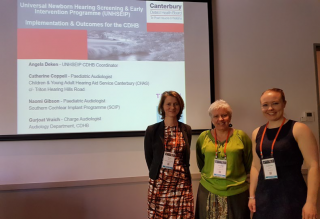- Home
- News
- Screening Matters, Issue 60, December 2017
- Benefits of the Universal Newborn Hearing Screening and Early Intervention Programme (UNHSEIP)
News
- Screening Matters Newsletter
- April 2019
- April 2018
- December 2017
- August 2017
- April 2017
- December 2016
- October 2016
- March 2016
- November 2015
- August 2015
- June 2015
- April 2015
- February 2015
- December 2014
- October 2014
- August 2014
- June 2014
- April 2014
- February 2014
- December 2013
- October 2013
- August 2013
- June 2013
- April 2013
- February 2013
Screening Matters
The National Screening Unit newsletter
In this issue:
- Benefits of the Universal Newborn Hearing Screening and Early Intervention Programme (UNHSEIP)
- Severe combined immune deficiency disorder now included in newborn screening
- Positive start to bowel screening in Hutt Valley and Wairarapa
- Sharing data to improve BreastScreen Aotearoa participation and attendance
- Profile of Mana Wāhine Day in Lower Hutt
Benefits of the Universal Newborn Hearing Screening and Early Intervention Programme (UNHSEIP)

Presenters at the conference included Angela Deken, Canterbury DHB UNHSEIP Co-ordinator; Catherine Coppell, Paediatric Audiologist Children’s Hearing Aid Service Triton Hearing; and Naomi Gibson, Paediatric Audiologist Southern Cochlear Implant Programme, with Canterbury DHB’s Charge Audiologist Gurjoat Vraich co-authoring the presentation. The presenters came together to describe the history behind the programme before outlining the screening pathway and the benefits of a national screening programme for identifying hearing loss.
The first six months of a baby’s life is a critical period for language development and lack of exposure to language at this time can affect a child’s development, communication skills and educational and career achievement. Prior to the national programme, the average age of hearing loss identification was about three to four years. Since the national rollout of the programme there has been a reduction in the average age at diagnosis of cases referred from newborn hearing screening in New Zealand from 10 months in 2010 to eight months in 2011 and five months in 2012, six months in 2013 and now to five months in 2014.[i]
The team presented examples of the benefits the newborn hearing screening programme had achieved for the population of Canterbury DHB. Feedback from one mother whose child’s hearing loss was identified by the newborn hearing screening team at Canterbury DHB commented that “Newborn hearing screening is so important. It has transformed my daughter’s life, and she has already achieved well and truly above the expectations of what professionals had once thought. Her everyday life, and her education as she gets older, is just going to be amazing because we have been able to put things in place for her as early as we did.”
Ear, Nose and Throat Consultant Surgeons Philip Bird and Melanie Souter noted that early diagnosis and early intervention not only make a huge difference for early speech and language development but have a massive impact for the rest of a child’s life. The significant contribution of UNHSEIP services at the District Health Board are acknowledged with Philip and Melanie noting that “… this is an example where screening makes an astronomical difference to individual outcomes and is highly cost effective to society.”
The newborn hearing screening service at Canterbury District Health Board is a good example of multidisciplinary collaborative team working across providers to ensure the delivery of high quality screening and early intervention services. Through this approach, the service is able to ensure early identification of hearing loss and provide information to the families about their child’s hearing abilities and choices for treatment and intervention. Having this knowledge empowers whānau to make informed decisions for the development and wellbeing of their child.
[i] J. Digby (2015) Deafness Notification Report.
To receive the Screening Matters newsletter by email, fill out our sign-up form.

